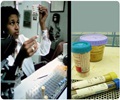Treatment of recurrent diarrhea caused by the Clostridium difficile bacteria can be done with the use of fecal material from healthy donors as per a new study

C. difficile infection has become an increasingly serious problem, causing around 250,000 infections requiring hospitalization and 14,000 deaths each year in the U.S. Hohmann notes that from two to five patients test positive for the infection at MGH every day. In patients with recurrent or treatment-resistant infection, long-term treatment with vancomycin or other antibiotics has had limited success, with symptoms recurring up to 30 percent of the time. In fact, antibiotic treatment has the potential of making matters worse, as it kills off the beneficial normal intestinal microbes that can keep pathologic species like C. difficile in check.
FMT probably treats C. difficile by restoring the normal balance of intestinal microbes. Previous animal and human FMT studies using fresh fecal material have had success rates of around 90 percent, but the MGH researchers note that recruiting and screening potential donors can be time-consuming and costly. Banking a supply of frozen, prescreened donor stool could significantly increase the availability of FMT, and the current study was designed to test the feasibility and effectiveness of such an approach, along with comparing two routes for delivery of the donor material.
Stool samples were donated by exceptionally healthy adults who received comprehensive screening for infectious diseases. Donors also were asked to refrain from eating any common allergens, such as nuts or eggs, in the days before donation. The donated fecal material was filtered, diluted, screened and frozen; stored for at least four weeks to allow retesting donors for any hidden infections; and prior to administration, thawed and kept refrigerated.
The study enrolled 20 patients – three of whom were children – who either had three or more episodes of mild to moderate C. difficile infection for which antibiotic treatment failed or had two episodes serious enough to require hospitalization. Participants were randomly divided into two groups – 10 who received donor material by standard colonoscopy and 10 who received it though a nasogastric tube (NGT) passed into the stomach. A single administration was successful in curing 14 of the 20 participants – 8 in the colonoscopy group and 6 in the NGT group, a difference not considered significant in such a small study.
Among those whose infections did not resolve, a single participant declined additional treatment. The other 5 received a second administration, which cured the infection in 4, for an overall success rate of 90 percent, similar to that of the previous studies. Participants who received the second infusion were allowed to choose the route of administration, and all chose to receive it via NGT.
The research team also reports treating an additional 11 patients with frozen donor samples via NGT, achieving a 91 percent success rate, and they currently are investigating what may be an even more acceptable means of administration – via a capsule that would remain undigested until it reaches the small intestine.
Source-Eurekalert
 MEDINDIA
MEDINDIA



 Email
Email





